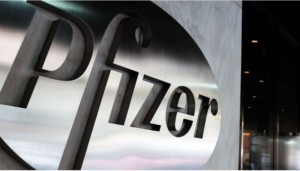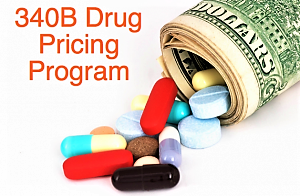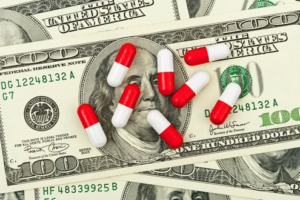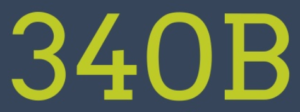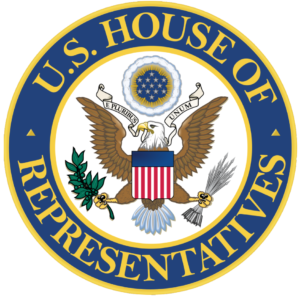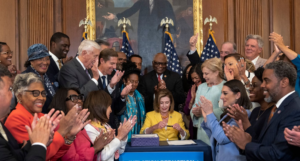- Pfizer offers ‘Breakthrough Fellowship Program’ that excludes Asian and White applicants (foxbusiness.com)
Pfizer recently launched a "Breakthrough Fellowship Program," which includes a scholarship for a graduate degree and guaranteed employment, for students and "early career colleagues of Black/African American, Latino/Hispanic and Native American descent," a requirement that could run afoul of federal law...READ MORE
- The 340B Program Climbed to $44 Billion in 2021—With Hospitals Grabbing Most of the Money (drugchannels.net)
Here’s a summer surprise for fans of the 340B Drug Pricing Program: Drug Channels has just obtained the 2021 figures from the Health Resources and Services Administration...for 2021, discounted purchases under the 340B program reached a record $43.9 billion—an astonishing $5.9 billion (+15.6%) higher than its 2020 counterpart. Hospitals accounted for 87% of these skyrocketing 340B purchases...What’s more, the difference between list prices and discounted 340B purchases also grew, to $49.7 billion (+$7.0 billion). This figure approximates the money collected by 340B covered entities...340B advocates have been screaming that “drug companies are cutting 340B,” but the data tell a very different story. Only in the U.S. healthcare system can billions more in payments and spreads be considered a cut...READ MORE
- Group of 23 states tells U.S. court CDC lacks authority to set transit mask rules (reuters.com)
A group of 23 state attorneys general led by Florida told a federal court on Monday that the U.S. Centers for Disease Control and Prevention lacks the legal authority to impose a nationwide transportation mask mandate to address COVID-19...The CDC sought "an unprecedented masking mandate regulating every breath of millions of Americans," said the brief in support of the group that sued to overturn the mask mandate...The group, which included Arizona, Georgia, Indiana, Missouri, Ohio, Texas and Virginia, urged the appeals court to reject the CDC "overreach."...READ MORE
- It’s time to expose the secret drug scam at the heart of American health care (finance.yahoo.com)
A federal court recently exposed the rot at the heart of America's healthcare system...The case, filed in the U.S. District Court for the District of Columbia, partly revolved around the many low-income, and even middle-income, patients who receive "co-pay coupons" from drug manufacturers to help them cover their out-of-pocket costs at pharmacies...For many Americans, these coupons represent the difference between filling a prescription and going without lifesaving care. But in recent years, health insurers have started to effectively steal those coupons, leaving patients on the hook for far higher expenses. As Judge Carl Nichols noted in a May ruling, insurance companies "pocket for themselves at least some of the assistance."...Sadly, the practice is totally legal. And until lawmakers crack down on this sort of grossly immoral behavior, insurance behemoths and their allies will continue shifting costs onto patients, with disastrous consequences for individuals' health and society at large...READ MORE
- The Pharmacy Benefit Manager scam (americanthinker.com)
When I served as a White House health advisor, I invited a group of large employers to describe the challenges company health plans faced. The top complaint? An obscure type of middleman that’s part of every health plan -- the Pharmacy Benefit Manager. The PBM industry, with only three giant companies controlling almost 80 percent of the market, offers a seemingly simple value proposition: if you’re an employer or an insurance carrier serving individuals or businesses, hire the PBM to help you get volume discounts on prescription drug makers...Sounds great! But, what if these middlemen pocketed much of the savings instead of passing them on to employers?...READ MORE
- Industry Voices—Integrating pharmacy into specialty practices improves access, care (fiercehealthcare.com)
Getting diagnosed with cancer or another life-altering illness can overwhelm patients, who suddenly face a complex condition while worrying about their future, family and finances. The ability to quickly access prescribed specialty medicines shouldn’t add to those worries...There’s a far more efficient way to handle this, both for patients and doctors: provide the prescribed medications at the cancer clinic or academic medical center where the patient regularly goes for testing and medical appointments. Embedding a specialty pharmacy within the practice—called medically integrated dispensing dramatically improves the healthcare experience by removing the PBM-controlled specialty pharmacy from the “triangle of care”—the doctor, the patient, and the pharmacist...READ MORE
- The Warped Rhetoric of Healthcare Compassion: Exposing the 340B Scam. (realclearhealth.com)
For too many years, too few policymakers paid any attention to the 340B drug discount program, blindly accepting the myth that non-profit hospitals and other covered entities were selflessly using 340B savings to “stretch scarce federal healthcare resources” in service of our most vulnerable patients...congressional neglect has resulted in significant financial abuse. Today there is ever-increasing evidence of the program’s out-of-control scope and a growing chorus from all corners of government who are finally beginning to see the 340B drug discount program for what it has become – a moneymaker for hospitals wrapped in the rhetoric of healthcare compassion...it is possible for hospitals to use 340B profit to bolster their own bottom lines on the back of uninsured Americans. (Though it’s more common, and more lucrative, for hospitals to soak payers – commercial insurance companies, Medicaid and Medicare – with marked-up claims for 340B-discounted medicines.)...While the Health Resources and Services Administration...has refused to acknowledge that 340B is a dysfunctional program in need of reform...READ MORE
- Democrats’ drug pricing reforms may not be so bad for pharma, analysts say (fiercepharma.com)
The legislation has drawn the ire of drugmakers and industry groups alike, who contend the price negotiations are more akin to price controls. Another common refrain centers around the law’s potential to stifle biopharma innovation...But the reality may not be so bad for the industry, with the true influence of the law on biopharma companies being marginal...the legislation is set to empower Medicare to set prices for 10 medicines in 2026, with that number increasing to 60 by 2029. In 2026 and 2027, Medicare will only oversee Part D drug prices...While the bill addresses some 64 million Americans enrolled in Medicare, it fails to account for the more than 150 million Americans and their families engaged with the private insurance market...READ MORE
- Pharma prepares to continue fight as drug pricing bill passes House (biopharmadive.com)Newly-launched U.S. drugs head toward record-high prices in 2022 (reuters.com)
The main U.S. drug lobby has said it will push back against the legislation, which includes policies that drugmakers have opposed for decades...The pharmaceutical industry is gearing up to minimize the effect of major drug legislation passed by Congress on Friday, the first time in many years lawmakers have overcome the drug lobby’s opposition to limits on their pricing power...the House of Representatives passed the Inflation Reduction Act in a 220-207 party-line vote, sending the bill to President Joe Biden...The bill would allow Medicare to negotiate prices on up to 60 drugs by 2029...The pharma industry spent heavily to lobby against the bill and, after decades of forestalling action to curtail the industry’s pricing power in the U.S., its main lobbying group signaled the fight would continue...READ MORE
- Drug price controls would limit new medicines (washingtonexaminer.com)Reducing Patient Access to New Medications: Progressives Latest Medicare Price Fixing Scheme (realclearhealth.com)
...Republican and Democratic senators met with the chamber's parliamentarian to discuss whether the bill's proposal for Medicare to negotiate the price of prescription drugs with manufacturers has a direct impact on government spending or tax revenue, as reconciliation rules require...But these are not negotiations. They're price controls. The bill's text sets maximum prices that the government will pay — and threatens confiscatory taxes for drug companies that refuse to comply...it will mean that fewer cutting-edge drugs are available to American patients...price controls on prescription drugs are unnecessary. Even as the price of just about everything else in our economy has soared in the past year, drug prices have been relatively flat...If lawmakers want to reduce patient drug costs meaningfully, they should train their focus on pharmacy benefit managers...PBMs keep a cut of the savings they extract and send another cut to the insurer, which may use that cut to lower overall premiums...READ MORE

